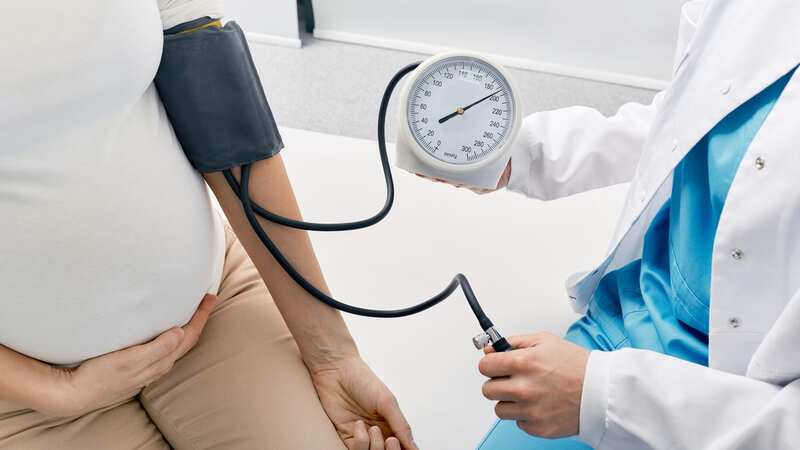What is pre-eclampsia and how deadly is the condition that affects 1 in 25 women

Around one in 25 pregnancies in the UK are affected by pre-eclampsia, which occurs when the placenta doesn’t get enough blood from the mother’s body - but what are the symptoms of the concerning condition?
The placenta develops during pregnancy and attaches to the lining of the uterus, delivering oxygen and nutrients to the growing baby through the umbilical cord. According to the NHS, pre-eclampsia affects some women usually during the second half of pregnancy or soon after the baby is delivered.
Dr. Sara Mesilhy, gastroenterologist at Royal College of Physicians, told the Mirror: “Pre-eclampsia is generally called toxaemia of pregnancy. It occurs in around two percent up to 10 percent of pregnancies worldwide.
Want to get the latest health news direct to your inbox? Sign up for the Mirror Health newsletter
"It usually occurs late in pregnancy, after 34 weeks. In rare cases, it can come earlier up to 20 weeks of pregnancy or just after delivery; usually within 48 hours."
 Greggs, Costa & Pret coffees have 'huge differences in caffeine', says report
Greggs, Costa & Pret coffees have 'huge differences in caffeine', says report
The doctor added: "The exact mechanism that leads to the development of pre-eclampsia is unknown, but many studies have revealed that it is a disorder of the inner layers of blood vessels of the placenta affecting the way it works.”
The most common symptoms of pre-eclampsia is high blood pressure, also known as hypertension, and high levels of protein in your urine. While these symptoms are difficult to spot, they will usually be picked up by a midwife or GP during an antenatal appointment.
The NHS has also highlighted the other main warning signs to watch out for. These include:
Severe headache
Vision problems, such as blurring or flashing
Pain just below the ribs
Vomiting
Sudden swelling of the face, hands or feet
Dr Mesilhy said: "These manifestations may be presented by weight gain, shoulder pain, abdominal pain, severe headaches, change in reflexes or mental state, decreased frequency of urination, dizziness, difficulty in breathing, severe vomiting and nausea, vision changes like flashing lights, floaters, or blurry vision."
If you notice any of the symptoms listed above, you should seek medical advice immediately by calling your midwife, GP surgery or NHS 111. The health body writes: “The earlier pre-eclampsia is diagnosed and monitored, the better the outlook for mother and baby.”
 'I tricked my sister into giving her baby a stupid name - she had it coming'
'I tricked my sister into giving her baby a stupid name - she had it coming'
 Pre-eclampsia affects women usually during the second half of pregnancy (Getty Images/Tetra images RF)
Pre-eclampsia affects women usually during the second half of pregnancy (Getty Images/Tetra images RF)Why is pre-eclampsia dangerous?
If the condition goes undiagnosed, it can affect both mother and baby as it can cause issues with the mother’s kidneys, liver and brain. In rare cases, pre-eclampsia can lead to seizures, Dr Mesilhy added: “Pre-eclampsia is the pre-state of a dangerous condition called eclampsia, which is defined by the occurrence of seizure plus the preeclampsia triad.
"It is a serious complication of pre-eclampsia that can have health risks for the mother and the foetus and, in rare cases, cause death.” The British Heart Foundation (BHF) warns that it could lead to the baby being born early or at a lower weight than what is normal.
Research suggests that it can affect a mother’s long-term health, with neurologist Cheryl Bushnell stating that it doubles the risk of stroke and quadruples the risk of high blood pressure later in life.
Dr Mesilhy warns: “The decrease of placental blood flow to the foetus may cause foetal growth restriction, subsequently leading to premature births and the complications that follow, including learning disabilities, epilepsy, cerebral palsy, and hearing and vision problems.
“Placental abruption is one of the critical complications in which the placenta may suddenly separate from your uterus, which can lead to stillbirth. To the mother it may cause serious complications although rare, these include, stroke, seizure, heart failure, reversible blindness, and bleeding.”
A study of 1,157,666 women, published in the The European Society of Cardiology (ESC), found that those with pre-eclampsia were four times more likely to have a heart attack and three times more likely to have a stroke within 10 years of delivery than those without the condition. Researchers warned that the risk of heart attack or stroke was still twice as high in the pre-eclampsia group more than 20 years after giving birth compared to unaffected women.
Lead researcher Dr. Sara Hallum, from the University of Copenhagen in Denmark, said: “Women are often in contact with the healthcare system during and immediately after pregnancy, providing a window of opportunity to identify those at increased risk of cardiovascular disease. The number of women with previous pre-eclampsia is large, and routine follow-up could last years or even decades.
“Our study suggests that the women most likely to benefit from screening are those who had pre-eclampsia after age 35 and those who had it more than once. Prevention should start within a decade of delivery, for example by treating high blood pressure and informing women about risk factors for heart disease such as smoking and inactivity.”
 Pre-eclampsia occurs when the placenta doesn’t get enough blood from the mother’s body (Getty Images/iStockphoto)
Pre-eclampsia occurs when the placenta doesn’t get enough blood from the mother’s body (Getty Images/iStockphoto)The expert added: “Most cases are mild, but pre-eclampsia may lead to serious complications for the mother and baby if not treated in time.” It is important to note that in most cases, the condition causes no problems and improves soon after the baby is delivered, says the NHS.
Who is at risk of pre-eclampsia?
The health body states pre-eclampsia can affect anyone, but there are a number of factors that can increase your risk of developing the condition. These include:
Having diabetes, high blood pressure or kidney disease before you were pregnant
Having an autoimmune condition, such as lupus or antiphospholipid syndrome
Having high blood pressure or pre-eclampsia in a previous pregnancy
Family history of pre-eclampsia
Being 40 years old or more
It's more than 10 years since your last pregnancy
Expecting multiple babies (twins or triplets)
Having a body mass index (BMI) of 35 or more.
It is understood that if you have two or more of these factors, your risk of pre-eclampsia is higher. Dr Mesilhy highlights “getting pregnant at teen ages or after 40, having their first pregnancy, having babies less than two years apart and IVF pregnancy” as other risk factors to consider.
She said: “Although it's not always possible to completely prevent preeclampsia during pregnancy, there are several tips that can reduce the risk. The most important one is attending regular prenatal care appointments to monitor overall health and check blood pressure.
“Maintaining a healthy weight and following a healthy lifestyle includes a balanced diet, limiting sodium intake, avoiding smoking, and alcohol, exercising regularly, and managing any pre-existing medical conditions effectively.”
The NHS writes: “If you're thought to be at a high risk of developing pre-eclampsia, you may be advised to take a 75 to 150mg daily dose of aspirin from the 12th week of pregnancy until your baby is born.”
How is pre-eclampsia treated?
The BHF explains that the only way pre-eclampsia is treated is by giving birth, but this depends on how far along the mother is and how serious the condition is.
If the mother is 37 weeks or more into their pregnancy, doctors may decide to send them home or induce the labour or perform a caesarean section. They may also keep them in hospital until the baby is delivered without inducement.
If the patient is below 37 weeks, or has multiple symptoms, they may be kept in hospital to be monitored. The BHF says that doctors will try to avoid delivering the baby as they want them to be as developed as possible before birth.
However, if they believe the mother or baby’s health is at risk, they may deliver the baby before it has reached full-term. In the event of a premature birth, the baby will likely have to stay in hospital to receive specialist care.
Read more similar news:
Comments:
comments powered by Disqus

































